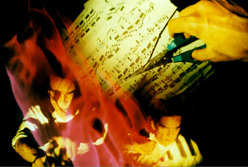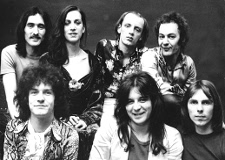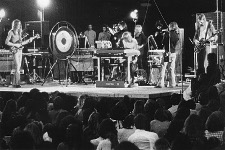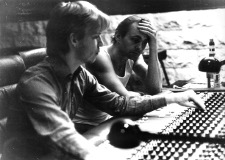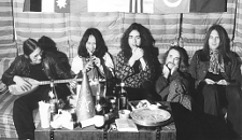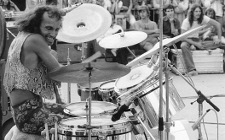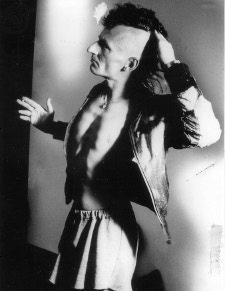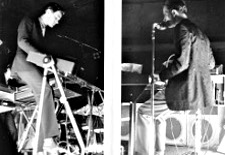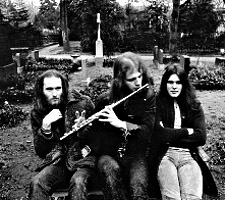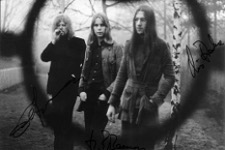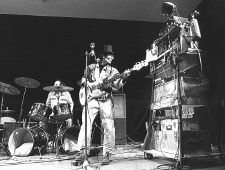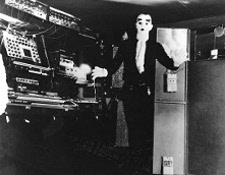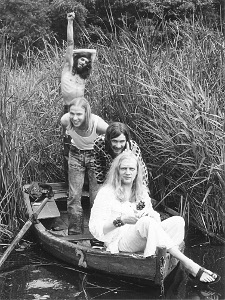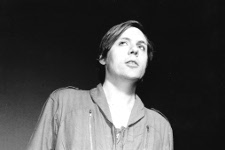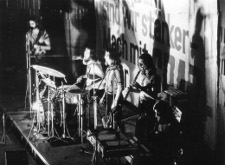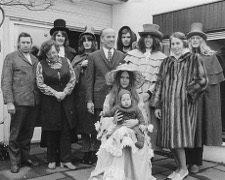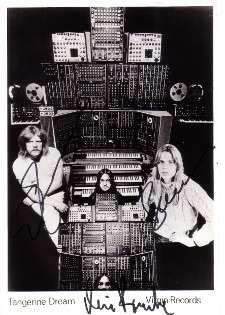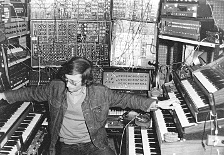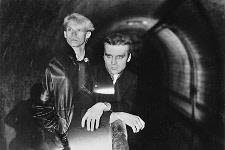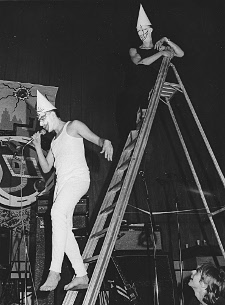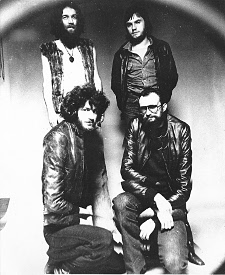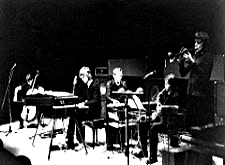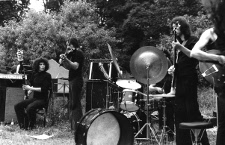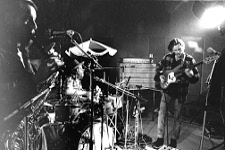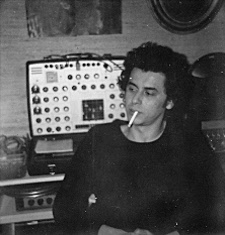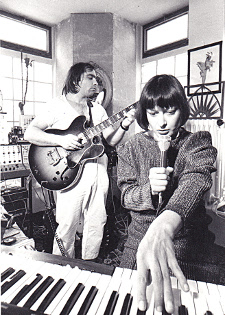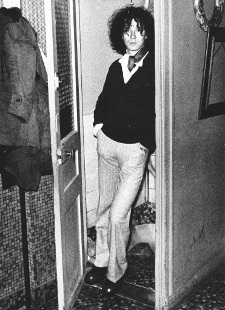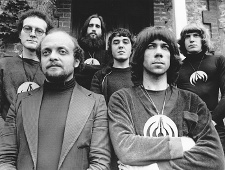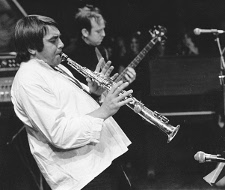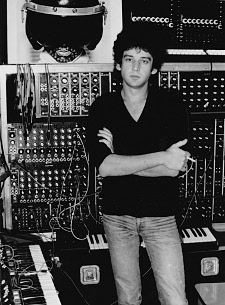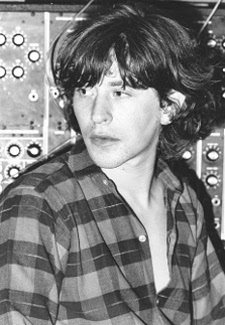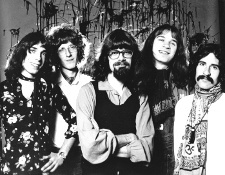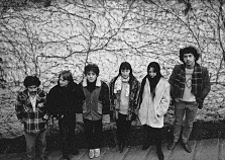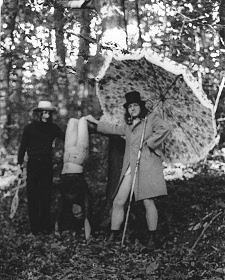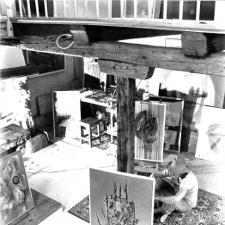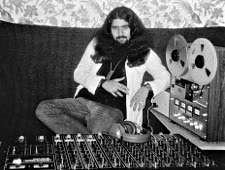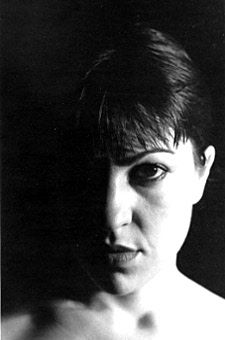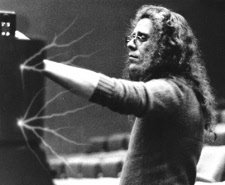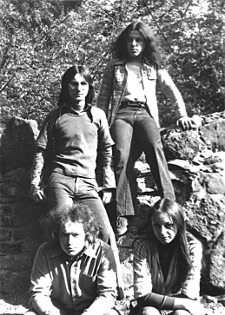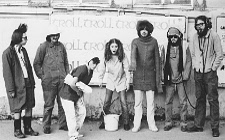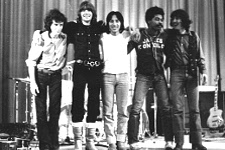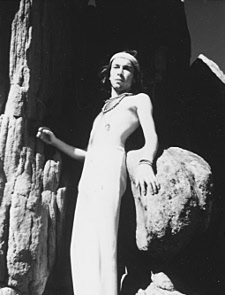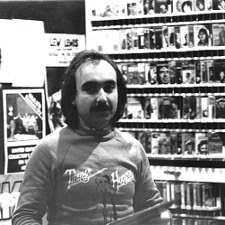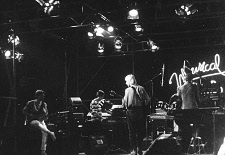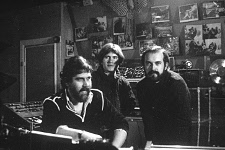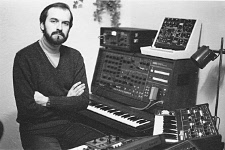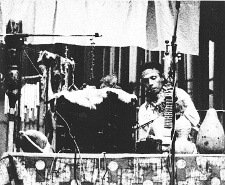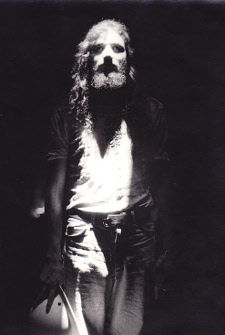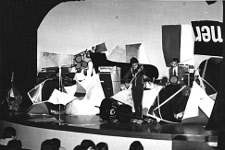SUPERNATURAL FAIRY TALES
THE PROGRESSIVE ROCK ERA

What is progressive rock?
A.) The most maligned genre in rock history.
B.) A term that inspires fear in the hearts of rock critics.
C.) The land of the dinosaurs that Johnny Rotten vowed to make
extinct.
D.) An ambitious, rich, and essential branch of rock that has
endured for nearly 30 years despite all that.

The answer, of course, is all of the above -- the latter
conclusion borne by the dynamic contents of Rhino's Supernatural Fairy Tales:
The Progressive Rock Era.
Three years in the making, this comprehensive five-CD
collection is drawn from the near-decade-long period during which prog rock was
reaching a peak of both creativity and global influence. And the box was
released in August 1996 as prog enjoyed its biggest surge of popularity since
those heady days.
Yeah, all you naysayers, you snooty critics, you might as well
go cower in a corner -- Prog Lives!
And my my, hey hey, rotten Johnny: Who's the dinosaur now, with
the you'll- never-see-me-in-a-reunion tour making its way around the globe?
With 53 tracks running the gamut from multiplatinum
international stars (Emerson, Lake & Palmer, Genesis, Yes, Roxy Music, The
Moody Blues, Electric Light Orchestra) to lesser known, but highly valued
innovators (Can, Faust, Ash Ra Tempel, Gong), Supernatural Fairy Tales provides
definitive proof that lumbering old prog-rock has survived quite well, thank
you. In fact, the market for both reissues of prog-rock classics and new albums
by young, prog-inspired musicians is experiencing a dramatic boom.
Today the originators of prog-rock are still on the forefronts
of vital music. Genesis (represented here with two tracks, "The Musical
Box" and "Dancing With The Moonlit Knight") gave us both Peter
Gabriel and Phil Collins.
Brian Eno (whose synthesizer innovations are heard in this set
on Roxy Music's "Ladytron" and "Virginia Plain" as well as
on the track by Quiet Sun featuring fellow Roxy-ite Phil Manzanera) went on to
reshape the sound of adventurous pop music as producer of key Talking Heads and
U2 albums, as well as with his own trend-breaking recordings.
Jeff Lynne, cofounder of Electric Light Orchestra (the cheeky
reworking of "Roll Over Beethoven") crafted the distinctive sounds of
the Traveling Wilburys and fellow Wilburys Tom Petty and George Harrison, not
to mention producing the "reunited" Beatles tracks "Free As A
Bird" and "Real Love."
Onstage, The Moody Blues (the Timothy Leary tribute
"Legend Of A Mind"), ELP ("Knife-Edge" and "Karn Evil
9: 1st Impression, Parts 1 &2") and Yes ("Perpetual Change"
and "Siberian Khatru") are again among the most popular concert
attractions.
And meanwhile, clear echoes of prog can be heard in everything
from techno-rave (try the 1970 track "Searching" by Tangerine Dream
member Klaus Schulze or Can's "Oh Yeah" alongside anything by such
current faves as the Orb or Orbital) to contemporary classical (check out the
offerings from Magma, Seventh Wave, and the Henry Cow/Slapp Happy
collaboration).
Heck, even the fantasy landscape cover painting created by
inimitable Yes artist Roger Dean -- the quintessential prog illustrator --
seems cooler today than, say, pink hair and safety pins through the cheek. In
fact, Dean's company designed the box for Supernatural Fairy Tales.
See, prog was never a matter of fashion (thank Heaven, given
the questionable style sense associated with its legion of fans), but of
philosophy.

"For sake of definition, progressive rock is more than a
specific style," writes Archie Patterson, the prog aficionado who
handpicked the music on this set from his extensive personal collection, in his
detailed notes that are included in the deluxe booklet accompanying the set.
"Generally it has been characterized as having a classically influenced,
symphonic, keyboard-dominated sound. In a broader sense, however, it was a
state of mind that was shared internationally by a group of musicians. They all
started with the beat, a guitar, and a keyboard, then grafted their own
cultural influences onto that foundation. The results were distinctive and
varied, but all shared the same open compositional style that allowed this new
musical mode to mutate into many different sounds."
Of course, prog was and is to this day routinely slagged as
pretentious, a term practically embraced in an affectionately humorous essay by
Los Angeles Times music journalist Steve Hochman (a rare rock critic who
actually admits to liking prog) that is also in the companion booklet, as are
memories and comments by some of the artists. "Prog-rock is aimed at the
brain, while blues-based rock is aimed at, well, another much-loved
organ," Hochman writes. "Speaking from experience, the mysteries of
the latter can be much more intimidating to many a teen-aged boy than the
former."
Prog, notes Patterson, was truly a product of fecund times.
Dylan and The Beatles had liberated rock, and musicians from all corners and
cultures approached a new world of possibilities with a sense of wonder -- and,
in some cases, irreverence -- to judge by the track which opens Supernatural
Fairy Tales: Keith Emerson and The Nice's 1968 romping interpretation (or, to
the piece's composer Leonard Bernstein, desecration) of "America"
from West Side Story. The closing "Inca Roads" by cultural iconoclast
Frank Zappa and his Mothers Of Invention shows the same disregard for
convention, characteristically wry, sarcastic humor and astounding musical
chops.
Thomas Koppel, conservatory-trained keyboardist of the Danish
band The Savage Rose (whose "Dear Little Mother" can be found on
Volume 3), remembers those times: "[Young people] were busy occupying
buildings, taking over universities, demonstrating against the Vietnam
War...and strange new music was shaking the ground, a quite different kind of
avant-garde. 'It's Alright, Ma (I'm Only Bleeding),' 'Hey Joe,' freedom,
freedom, freedom."
That climate gave rise to a wealth of experiments and
perrnutations involving, for the most part, varying degrees of rock, classical,
folk, and jazz elements and influences. Supernatural Fairy Tales covers the
full range, from the classical-folk sweep of Renaissance's "Kings &
Queens" and Curved Air's "It Happened Today" to the Baroque-ish
contrapuntal tapestry of Gentle Giant's "Free Hand" to the hippie
bliss of Gong's "Perfect Mystery" to the avant-garde minimalism of
Faust's "It's A Rainy Day, Sunshine Girl."
And at its peak, the prog movement truly spanned the globe --
Italy's PFM, Banco, and Le Orme; France's Magma; England-via-Germany's Nektar;
Greece's Aphrodite's Child (featuring future New Age star Vangelis); Finland's
Wigwam; and Holland's Focus are among those who join the English acts that make
up the bulk of the box.
"This is a cultural document of its time, this ten-year
window where because of many different events, culture and music in particular
flowered around the world," notes Patterson, who runs the prog-oriented
record distribution service Eurock.
Perhaps it was inevitable that times and culture would change
and that prog, mired in a morass of bloated egos and overinflated concepts
(Spinal Tap got that part dead-on with "Stonehenge") would be swept
away by a new generation of upstarts looking for their own definition of
freedom.
Yet, against all odds, prog has transcended the times in which
it thrived. "Great music," says Patterson, simply, "is
timeless."

53 TRACKS, 48 GROUPS, 5 HOURS
OF MUSIC
Disc 1
The Nice | Traffic | Procol Harum
| Pretty Things | The Moody Blues
Renaissance | Rare Bird | Pete
Sinfield | Klaus Schulze | Kingdom Come
Disc 2
Aphrodite's Child | Atomic Rooster
| Ash Ra Tempel | Van Der Graaf Generator
Can | Emerson, Lake and Palmer | Caravan
| Curved Air | Focus | Wigwam
Disc 3
Yes | Argent | Roxy Music | SuperSister
| The Savage Rose
Genesis | Electric Light Orchestra |
Strawbs
Premiata Forneria Marconi | Emerson,
Lake and Palmer
Disc 4
Genesis | Yes | Roxy Music | Wishbone
Ash | Lard Free | Amon Duul 2
Strawbs | Nektar | Ange | Le Orme |
Clearlight
Disc 5
Seventh Wave | Gong | Gentle Giant |
Henry Cow | Samla Mammas Manna
Hatfield & The North | Banco | Magma
| Faust | Quiet Sun
Golden Earring | Frank Zappa and The
Mothers of Invention
Now Out of Print! However If
You
Search the Net, Copies Are Out
There...
|
 reviews features podcasts email bio
reviews features podcasts email bio
